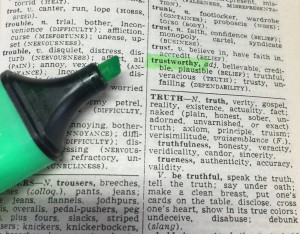The world is very much in need of trustworthy information provided by trustworthy people. In many cases, librarians are the trustworthy people par excellence. And that is good. Users trust us, 1) that we know everything about trustworthy sources, and 2) that we do everything to make them available. The trustworthiness of librarians is legendary, it is proved, it is evidence-based and built into our genes. In an OCLC survey on the perception of libraries versus search engines such as Google [1], 91% Americans found search engines faster, 90% more convenient, 83% easier to use, and 72% more reliable than libraries. The only two categories, where libraries exceeded were accuracy and … trustworthiness. 65% considered libraries more trustworthy than search engines.
Recently, this important characteristic was neatly summarized by librarian Marcus Banks: “One of the long-prized skills for librarians is the ability to guide people to trustworthy sources. This can happen in multiple ways, either a direct and straightforward referral to a particular source, or (hopefully) via an instructional session that provides people with tools for evaluating the trustworthiness of sources they find on their own. In either case, the librarian is the filter for trustworthiness.” [2]
This may change in the next few years as Google has successfully developed a mechanism for ranking search results by the trustworthiness of the sources. Eventually, this would make the search engine the arbiter on right and wrong. [3] That may put a totally new viewpoint on the Google motto: “Don’t be not evil” [4]. If Google stepped into the trustworthy business, that may change our perception of the world fundamentally, because we see the world through Google eyes. Google increasingly decides what we see and what we do not see [5].
Banks commented: “If the Google team’s proposal goes forward, there would be less need – perhaps eventually no need – for librarians to serve as such a filter. I argue for two actions in a ‘Google trustworthy sources’ era: concentrate on helping people synthesize and evaluate the content they locate, moving into a more pedagogical vein; and intensify our focus on collecting, curating and preserving the unique content of our own institutions. […] Both approaches would demonstrate the continued vitality of librarians in the digital age.”
I hope he is proved right.
- OCLC. Perceptions of libraries, 2010: Context and Community 2010. Available from https://www.oclc.org/content/dam/oclc/reports/2010perceptions/thelibrarybrand.pdf
- Banks M. Google as trustworthiness filter, and what it means for librarianship. Marcus’ World 03.05.2015. Available from http://mbanks.typepad.com/my_weblog/2015/05/google-as-trustworthiness-filter-and-what-it-means-for-librarianship.html
- Weinberger D, Gillmor D. So Sayeth Google. The search engine should not be the arbiter of truth. Slate 13.03.2015. Available from http://www.slate.com/articles/technology/future_tense/2015/03/google_search_results_accuracy_the_search_engine_shouldn_t_decide_what_s.html?wpsrc=sh_all_mob_em_ru
- https://en.m.wikipedia.org/wiki/Don’t_be_evil
- Pasquale F. The black box society: The secret algorithms that control money and information. Cambridge: Harvard University Press; 2015.
This post will be published in the December issue of the Journal of the EAHIL.
Foto by Oliver Obst
